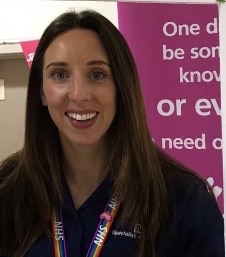What motivates you to wake up and go to work?
I’m constantly in awe of our donor families. I have so much admiration for their strength and generosity; their willingness to help save the lives of other people at the most tragic time in their lives is truly amazing. Many donor families have fed back that donation provides comfort in an otherwise devastating situation. Each family is given the option to receive recipient outcome letters through donation services, which also provides comfort during the grieving process.
How long have you worked at Royal Brompton and Harefield hospitals?
I have now been a specialist nurse for organ donation (SNOD) for three and a half years.
Can you describe what you do day-to-day?
I work in the wider London Organ Donation Services team within NHS Blood and Transplant, where I am assigned as one of the SNODs for Royal Brompton and Harefield hospitals.
When the medical team determines that a patient is not going to survive their critical illness, they will make a referral to the organ donation team. My role is to attend the intensive care unit (or emergency department) and assess if a patient is a potential organ donor.
For patients who meet the criteria to become an organ donor, I would check the organ donor register to determine if the patient has registered a donation decision. I would attend end-of-life discussions with the patient’s family and offer donation as an option, extensively supporting them to make informed decisions that are right for them and their loved one.
If the patient’s family give consent for organ donation, I would facilitate the completion of all the relevant paperwork and assessments to be able to register the patient on the national transplant system which covers all of the UK. If a recipient match is found, I would arrange for specialist retrieval surgeons to attend the hospital and carry out the retrieval operation. The organs would be transported by specialist ambulances so that the recipients can receive their transplant within the necessary time frame.
As part of leading organ donation within the hospitals, my team also provide teaching to nursing and medical colleagues. We complete a monthly audit to ensure no potential donation opportunities are missed. We facilitate hospital development for organ and tissue donation and are involved in quality improvement projects and policy development.
Which part of your job is most challenging?
The role can be highly emotive and challenging, but I am lucky to work with an amazing team. We are given the opportunity to have formal debriefs where we can discuss particular cases that have been emotional or challenging.
What is the most heartfelt thing a patient’s relative has ever said to you?
One of my donor family members once said that nothing will ever replace the loss of her son, but knowing he was able to help save the lives of others brought an incredible sense of pride and comfort.
Why did you decide to work in healthcare?
A number of my family members work in healthcare, and they inspired me from a young age to become a nurse. Before becoming a SNOD, I worked in emergency and intensive care in Dublin, Sydney, Bristol and London. I worked in several major trauma units and hospitals that also performed transplants. I was regularly exposed to the world of organ donation and transplantation which inspired me to pursue my current role.
What did you want to be when you were younger?
A member of the Spice Girls…
